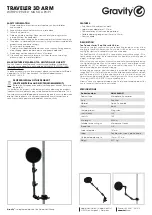
Version 1.0
©Copyright 2015, Ambient LLC. All Rights Reserved.
Page 2
1.
Introduction
Thank you for your purchase of the Ambient Weather DHR70B-BRASS Handheld Fishing Barometer.
The following is a guide for preparation, care and operation of your barometer.
2.
Preparation
Your weather instrument may include a protective pad to prevent damage to the barometer glass case
during shipment. Remove this protective pad and circular instruction sheet.
Your barometer must be calibrated to the local relative pressure before use. Please reference Section
4.4.
3.
Care and Cleaning
Avoid use of harsh household cleaners and coarse paper towels, which can scratch the bezel or lens.
Fingerprints and dirt may be removed the lenses and bezels with a soft cloth lightly dampened with a
mixture of water and mild dishwashing liquid. Be sure to dry the lens and bezel with a soft cloth
after cleaning.
4.
Aneroid Barometer
4.1
How the aneroid barometer works
An aneroid barometer uses a small, flexible metal box called an aneroid cell. This aneroid capsule
(cell) is made from an alloy of beryllium and copper. The evacuated capsule (or usually more
capsules) is prevented from collapsing by a strong spring. Small changes in external air pressure cause
the cell to expand or contract. This expansion and contraction drives mechanical levers such that the
tiny movements of the capsule are amplified and displayed on the face of the aneroid barometer. Many
models include a manually set needle which is used to mark the current measurement so a change can
be seen. It was invented by Blaise Pascal.
4.2
Reading the barometer
It is highly advisable to lightly tap the glass near the center brass knob with your fingers before taking
a barometer reading. The light tap will overcome any friction that may affect accurate hand readings,
especially during periods of slow atmospheric changes. The Coast Guard has informed us that tapping
the barometer is even required on the most expensive aneroid barometers, because the mechanism is
made deliberately “stiff”.
The ability if the barometer to indicate changes in barometric pressure makes it a useful instrument in
weather forecasting.
The weather forecast or pressure tendency is based on the rate of change of barometric pressure. In
general, when the pressure increases, the weather improves (sunny to partly cloudy) and when the
pressure decreases, the weather degrades (cloudy to rain).
The weather forecast is an estimation or generalization of weather changes in the next 24 to 48 hours,
and varies from location to location. The tendency is simply a tool for projecting weather conditions
and is never to be relied upon as an accurate method to predict the weather.























